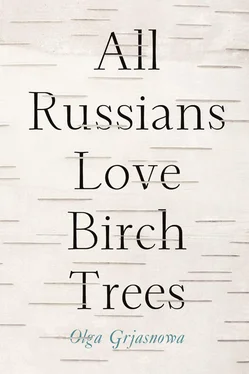“Don’t worry,” Hannah whispered and pointed at the pieces of paper on the ground. “The rabbinate will bury them on the Mount of Olives.”
Hannah and I sat in a cafe. She had ordered for both of us and was now speaking into her cellphone in rapid-fire Hebrew. Her voice resonated with a slight rasp. Hannah had moved back in with her parents, but wouldn’t tell me why.
I tried calling the number on the paper I’d gotten at the airport, but the department for shot luggage didn’t seem to exist. I was passed back and forth between the Department of the Interior, Tourist Information, and the Jewish Agency. No one wanted to buy me a new computer. Hannah tried to cheer me up by explaining the difficult political situation and listing a few of the recent attacks. She was afraid I was going to resent Israel for it so she drew small circles on my map, one for every attack — until her cartography of terror was complete.
“How’s the coffee?” Hannah suddenly asked.
“Good.”
“Seriously?”
“Yes.”
“I find it horrible. I can’t get used to the coffee in this country.”
“I’m sure you could find imported coffee.”
“It’s not that easy. What would come of us if everyone were to buy only imported goods? The economy would collapse. No more country for us. The Arabs are having more children anyway and the Orthodox do nothing but make children. Soon we won’t exist here anymore. Only the Orthodox. No, I have to drink this coffee. There’s no other solution.” Hannah laughed her full-throated laugh: “You fell for it, didn’t you? You should have seen the look on your face. My husband looked at me like that, too. Disgusted, no matter how early in the day. I don’t know what was harder on him. My character or my body.”
“Did you get a divorce?”
“Not yet.”
“What about your daughter?”
“She has blue eyes and a full head of dark, curly hair. A delightful kid. Everyone envies us our child. Our happiness. After the split we arranged that he’d come daily to see her. In the beginning we put her to bed together. Sometimes he came early and they would watch a cartoon. Sometimes he stayed longer and had a glass of wine with me. He blames me.” Hannah’s face was inscrutable. “He smelled like another woman. Then he disappeared and postcards of vague landscapes and abstract paintings started arriving in our mailbox. I figured out that he was hiding thirty miles north, in a kibbutz. Only oranges, no abstract art in sight. I took my daughter there. He was tan and well rested. Ate an orange, smiled at us. I pressed my daughter into his arms, said I had to use the bathroom, and drove off.”
We had passed a small checkpoint, surrounded by flower beds. Ma’ale Adumim was in the middle of the desert, on a hill from which you could (and certainly also should) see all the way to Jordan.
A young soldier waved us by with her gun, yawning. And then there we were, in the middle of a neat suburb: flower beds, preschools, synagogues, a shopping center, and clean white houses with red-tiled roofs and white water tanks. Boys sat at the bus stop, legs apart, scratching their balls.
The Arab villages that Hannah and I passed on our way from Jerusalem to Ma’ale Adumim had had flat roofs and black water tanks. Sami and Cem had thrown their hands up in horror when the radio talked about Israeli settlement policy. Elisha had stayed out of it, had rolled joints or cooked. Always with fast, precise movements, to signal that it wasn’t worth starting a fight, because dinner or lunch was almost ready.
Ma’ale Adumim was one of the largest settlements in the West Bank. My relatives weren’t settlers who dreamt of biblical borders. When they’d arrived in Israel in 1990 as part of a big wave of immigrants, there was little housing space. To buy an apartment they had to take on a mortgage for the next twenty-five years. Since they spoke only Russian they didn’t understand the concept of a settlement. By the time they figured it out, years later, it was already too late: they had lived through the Gulf War and their kids served in the army.
We parked directly in front of the house. At the door, Hannah entered the security code “1–2–3–4” and we went in. The stairway was bright and smelled of animals.
Aunt No. 13 had a childhood in the Soviet Union under her belt, and was now a woman with heavy bags under her eyes, varicose veins, and smeared makeup. She was into bird-watching. She shared the photos she took of rare species with other bird-watchers on the Internet. Her husband, my uncle, was still good-looking. He was small in stature and had a flattering smile. We were immediately sent off to the bathroom to wash our hands and then they sat us down at the table. The latter was set with crystal glasses and porcelain from Soviet factories.
“Do you like Israel?” Aunt No. 13 asked.
I said that I did.
“Everyone who doesn’t have to live here says that,” my uncle countered promptly. Just like my father, he bore a grudge against Jews.
“You don’t love your family,” said the aunt, fixing him with a cold stare.
“What is that supposed to mean — I don’t love my family?”
“If you loved us, you wouldn’t say things like that.”
“Everyone here believes the whole world hates them. It’s the only thing people can agree on. The world hates the Jews,” my uncle said.
“And you? Hypocritically eating your soup here? What do you think would happen if the folks at your newspaper were to find out that you live in a settlement? You poison everything with your leftist demagoguery. And you don’t even love your family.”
My uncle grinned and said to my aunt, “But I do love you.”
“In Berlin, they now advertise the Jewish museum on milk cartons,” I said, because I couldn’t think of anything else.
“We made it onto the milk carton. We’re getting somewhere,” Hannah said dryly.
My aunt giggled, but then she turned toward Hannah and snarled at her, “When was the last time you saw your daughter?”
“My mother thinks you’ve got to take the first thing that comes along and stick with it for life. By myself, I’m worthless to her. I’ve got to have a husband and take care of my child. As you can see, Soviet thinking patterns are hard to erase. She misses my husband more than I do.” Hannah rolled her eyes and left the room.
“Where are you going?” my aunt yelled after her.
“To the bathroom!” Hannah shouted and left me alone with her parents.
“She has too much of a temper. No man could stand that for long,” my aunt mumbled.
The lunch dragged on. My aunt had prepared almost every dish she knew. She gave everyone a generous portion and didn’t wait until it had been eaten to force seconds and thirds upon us. Hannah didn’t come back from the restroom. My uncle encouraged my aunt: “Masha is too shy to help herself.”
“No, she’s worried about her weight,” said Aunt No. 13, as she unloaded more chicken legs onto my plate.
I asked myself whether the impulse to drown the following generation in food had more to do with the Caucasus mentality or the Holocaust legacy of my grandmother. My grandmother and her little brother had arrived, starved, in Baku. They were the only surviving members of their family. For the rest of her life she remained concerned that we wouldn’t have enough to eat and every meal in her house was a feast. I think she’d been the one to introduce hedonism into our family. She had tried to instill in her daughters the philosophy of living every day as if it were their last. Nothing was postponed until tomorrow. No purchase, no feast, no caress. My grandmother had voted for Rabin because he resembled my grandfather and died two months after Rabin’s assassination.
Читать дальше












